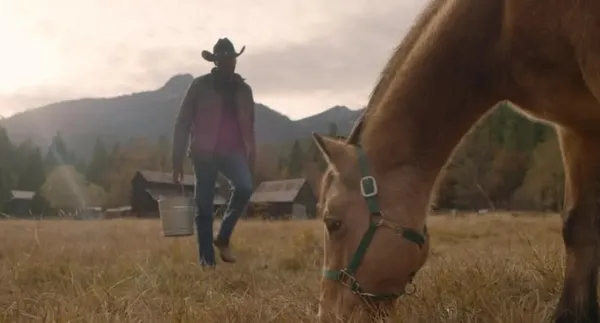 |
| Colman Domingo and Butterscotch in North Star |
If you wonder why the big film awards often seem to focus on just a small group of titles, perhaps overlooking the best films you’ve seen, the reason is this: it’s simply not possible for most voters to make the time to watch everything that’s put forward, and when deciding what they ought to see, they rely a lot on word of mouth. With short films, however, it’s different. They have to make their way through an exhausting system of festival selection and competition, so only the very best make it to the point where they get voter attention. If a short film is Oscar-qualified, it’s almost always worthy of your attention. This year, the films on that list include PJ Palmer’s North Star, and to date it’s one of the strongest contenders.
 |
| Colman Domingo in North Star |
“The biggest challenge going into it was to be vulnerable, but to to put my my own some of my own story into it.” says PJ when we meet to discuss it. “That was challenging. I can't remember what book I read, it's a book about writing, and one of the things it says that you don't don't write what scares you, write what will change your life. And I found that to be so much more scary. I mean, wait, what is my life? That's huge. And so, I felt like, well, write what changes your life means being very honest, very vulnerable and open. And I challenged myself to do that. And so I added a reflection of my own relationship. I'm in a same gender multicultural relationship myself. So I reflected that in the film, and that was, for me, really challenging. To be that open with people, to reflect some of the things my partner and I have been challenged with, or things people say, you know?”
The film follows Jimmy (Colman Domingo) and his husband Craig (Malcolm Gets), the latter of whom is seriously ill and needs full time care. They live on a remote ranch and Jimmy, who has already sold most of their horses in order to meet their expenses, is faced with a heart-rending decision in order to keep the two of them together, whilst Craig has to cope with his well-intentioned but religiously homophobic sister Erin (Audrey Wasilewski) taking advantage of his situation to try to overrule his wishes.
“It's been sitting around for a long time,” says PJ, of the script. ”I wrote it based on some friends of my family who through something similar, where the wife had a terrible stroke in her fifties. She was way too young. And she never spoke again and never walked again. She was very disabled after that stroke, and her husband just took such good care of her. They didn't have to lose their ranch or anything, you know, that I added that into my film for the drama, but I just loved how much he took care of his wife, and that he didn't move her out of the house that they had raised their kids in, they didn't move to town, they stayed out in the woods. And I just thought, that's such a beautiful love story, right? I kept thinking to myself, he is her north star. Even though she can't speak, she knows that he's going to always be there for her.
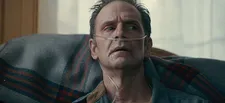 |
| Malcolm Gets in North Star |
“That inspired me to write the story. And I wrote a version of the story that was very much inspired by them. And then after the 2016 election in the ‘States, like most Americans, I was very upset. That didn't go well. I was thinking that democracy is over, right? Like, at least in the United States, it's over. And I knew the Supreme Court would be changed dramatically. And it has, and with that change comes the removal of rights, which we're already seeing happen in our country. So I knew that from 2016 forward, I was like, well, here we go. So that's when I put my own story into the script, where I got brave enough to say, ‘Okay, the main characters are reflective of me and my story, because I think it needs to be told.’ I think we need to tell stories that let people know like, hey, love is love.”
“I do believe that in this country, the right for non-straight marriage will be removed by the Supreme Court. That's definitely going to happen, likely this year. And so, you know. I really liked the characters in the North Star. Their love isn't up for argument, right? You can't argue with it. They clearly love each other and that's all that really matters. I think that's the point.”
I mention that for me as a disabled person, the film was powerful in part because of Malcolm Gets’ performance and how much opportunity he has to contribute to the telling of the story, rather than being a tragic object as is frequently the case with severely disabled people in films.
“In the opening shots of him, I want us to feel like his dignity is on the line,” says PJ. “If it wasn't for the love of his partner...he is treated like an infant. That's what happens, right? He needs help changing his diaper, and there's so much dignity removed for a grown up person when that has to happen. And so I wanted to see really inside what that feels like, you know, when you can't even clean yourself, and the pain of the loss of the ability to clean yourself, and the removal of dignity. And yet, the way his husband is doing it, so kind and gentle, gives him his dignity, you know? And I think that's the part that helps us, as an audience, really connect to it.
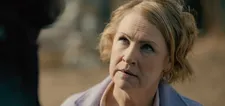 |
| Audrey Wasilewski in North Star |
“You can feel his pain right away, because the opening shots are close and he looks miserable. Because this is the condition he's found himself in. His brain is fine but he can't do anything. And yet, he's also so grateful that he found a partner that takes care of him the way he does. That is why the bathtub scene is what it is, because I think that's James giving Craig all the dignity in the world, but the dignity of intimacy, right? It's not just the dignity of ‘Oh, you're a grown man and human, I know you're fine inside your brain, ‘ but also ‘I still love you, I still am attracted to you, you're still with me, we're still going to be skin to skin and nothing's ever going to get in the way of that.’ And I think that's where those themes come in so powerfully, because Malcolm’s performance is showing what that loss of dignity is and that his partner is helping him get it back or hold onto some small part of it.”
It seems important to the balance of the film that we also see that Craig’s sister loves him, even though she perhaps doesn't really notice that he's there anymore, mentally.
“Yeah,” he agrees. “Erin definitely loves her brother but she doesn't give me any sort of dignity. She does the opposite of what his husband does. She comes in like a hurricane, like this huge force of nature. She doesn't ask any permissions. She just takes over and then treats him like an infant. She's forcing him to eat, you know, forcing him to watch TV. There's very little where she's actually taking into consideration what he might be thinking or feeling. Whereas his husband, that’s all he thinks about.”
The television is tuned to a Christian evangelist channel - with Kevin Bacon clearly having fun playing the part of a preacher – where there is a lot of talk about the sinful nature of homosexuality, along with a lot of requests for donations.
“Yeah, the television was, I use it as a device. It's in the background giving you all this info that the characters can't give you. That would be silly if they said it. You're getting all this backstory, and maybe even the subtext of Erin, what she actually thinks and feels, is being told to you by the television. And that’s part of the challenge of trying to write a short story, right? How do you get all that information out in less than 30 minutes? So the television was written in for that reason, just to get the audience as much information about these characters as they can. I mean, Erin does talk a lot and she does have lines outside of that. I think the TV might have the most lines in the whole film, which is funny, but Erin does say a lot. We do learn a lot about her by what she says. But that television gives us so much more.”
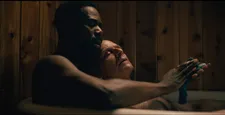 |
| An intimate moment |
The quality of work delivered by the actors made his job a lot easier, he says.
“My job became working with the director of photography, to be honest, because those guys, all of them, including Kevin and Laura [Innes], on the television, I mean, they just came with their A game and those relationships developed in seconds, and then they felt so strong. I definitely give direction here and there, but the big secret is just get the very best talent you can possibly get, and then let them run with it. I actually think that it really comes back to the script. People often ask me, ‘Well, how did you get these actors?’ The script. You could not pay those actors enough money to do something that they didn't want to do. And we didn't have a budget. We paid them on the SAG short film budget which is like, 100 bucks a day. It doesn't even pay for food. And they did it because of the script.
“So you know, Kevin and Laura, we shot that in November 2018, two years before we shot the rest. We were supposed to shoot the movie in March of 2020, and clearly that didn't happen, because California shut down – with the rest of the world – and so we didn’t shoot till the following November.”
He was nervous about putting together footage shot so far apart, he says, but relieved by the eventual result.
We talk about the animals in the film, Colman’s very natural connection with the dogs and, particularly, the horse, Butterscotch, who won an award for her performance.
“Butterscotch is an award winning horse,” PJ nods, smiling. “You know, she's very docile. She lives on a ranch where families go to ride horses up in the mountains, like trail horses. You’ve got to have really calm horses if you’re putting kids on them and then taking them to the woods because you know, the woods have things like rattlesnakes. She's not going to freak out. You're going to put your five year old on that horse and be fine. She’s beautiful and she fitted the part but also I knew she wasn’t going to kick and she wasn’t going to bite anybody.
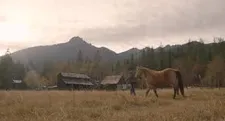 |
| Out on the ranch |
“She did bite Chris Sheffield. But that was his fault,” he says, laughing. “He wasn't even in the shot. He was standing there holding the horse and he held up his hand and said ‘Hey, this is blood.’ I just said ‘Oh my God. We’re out in the middle of the woods. Don't get hurt!’ And he's like, ‘I don't think she meant to bite me.’ He didn’t hold his hand flat. She can't see, you know? Her eyes are right up here.” He gestures towards the sides of his head. ‘So anyway, so she did bite him on accident.
“Coleman has a lot of experience. On Fear The Walking Dead his character rides a horse. He's very close to that horse. He's talked about it quite a bit. So he was he was very comfortable with Butterscotch. And then the other thing is, you know, we just kept treats in our pockets. And so you often see her in the movie sort of nudging him and sort of pushing her nose towards him, because there's treats in his jacket pocket.”
I tell him I’m pleased to hear that she was rewarded for her hard work.
“She was! She only worked for five days and she gained weight. Her owner said we had to stop because she was getting fat.” He laughs. “She enjoyed it a lot and got lots of treats. And then the dogs, they were just puppies. I think they're only a year old. I mean, they look full grown, but they're one year old dogs that are very, very untrained, and just beautiful. And so with them, again, it was just treats, and their owners – their owners were always just off camera, because they'd do anything and as long as they saw their owners, they were happy.”
So what about the location? The film looks stunning; it’s obviously really well shot, but the landscape and building contribute a lot.
“I spent years looking for that location, years,” says PJ. “I looked all over California and all of the Sierra Nevada. I live in Alberta, Canada, and ultimately, I went back to the county that I grew up in. That's where we shot: it's called Trinity County and it’s in northern California and I lived there when I went to high school. That's where I moved away from to go to LA to get into film. This was decades ago. And I ended up going back there and it just had everything I needed. It had the house and the barn and the bathroom. It's all there. I had never seen that ranch before until I went out there and found it. And I was like, ‘Wow, now this is the spot.’
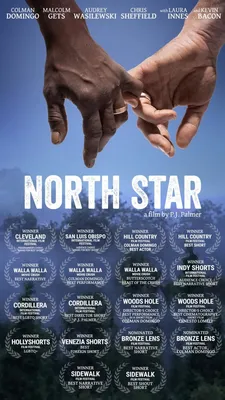 |
| North Star poster |
“It's very remote. There's no cell service. There's no cable TV, there's no internet. There were no landlines, there's no phones, there's nothing. There's just electricity and water. You know, they use the wood stoves to heat the place. And we got our news from the mailman. When he would come by once a day with the mail, he would tell us what was happening out in the real world. We shot just after the 2020 election so we weren't even sure what the election results were. We found out from the postman. It was great, though. It was really nice to be up there. We were there for a total of seven days. Being off the grid was wonderful, especially during that time. It was hard to come back into society.”
He never expected the film to be so successful, he says.
“I think I'm still in shock. I love the film. I'm very proud of it. But the response I'm getting is much deeper than I had expected. People really connect to it. We were just at Newport Beach last week in a film festival, and Audrey Wasilewski who plays Erin was there with me, with the producers, and we played in the middle of the block so there were two movies after our movie, and then we had a Q&A. And then we had a photoshoot with all the filmmakers afterwards, it was a good half an hour after the block played, a good hour and a half after our film played. And this woman came up to us, and she broke down sobbing. She said ‘I don't know, why do you think that your movie has touched me so deeply and I can't stop crying?’ And she's like, ‘But thank you. I'm really grateful for this film.’
I didn't expect those responses. We get them often, where people have a very deep connection to the film, whatever it is. So I couldn't be happier with this. What you want as a storyteller, you want people to really understand everything you did, and respond to it. And so I'm thrilled to be Oscar qualified. It’s incredible. I mean, I really hope we go the whole way. And it's not just because I want a gold statue on my bookshelf. I mean, of course I want that. That'd be great. But it'll mean people will watch the film. Right? Because there's no real market for short films. It's not like it's not going to go out to theatres and stuff.
“There's another sort of statement that I keep bringing up from another book I read. this book is called The Overstory. It's a novel, a narrative fiction novel, but there's a quote in that book that I often say. I sent it to the actors and the crew while we were making the film and I often say it to the audiences at festivals. And the quote is, ‘The best arguments in the world never change a person's heart. The only thing that can do that is a good story.’ And so that's what we set out to do. There’s no argument here, just a good story, and I think if you can come watch it, it might at least open up a conversation about things that we need to talk about.”





















